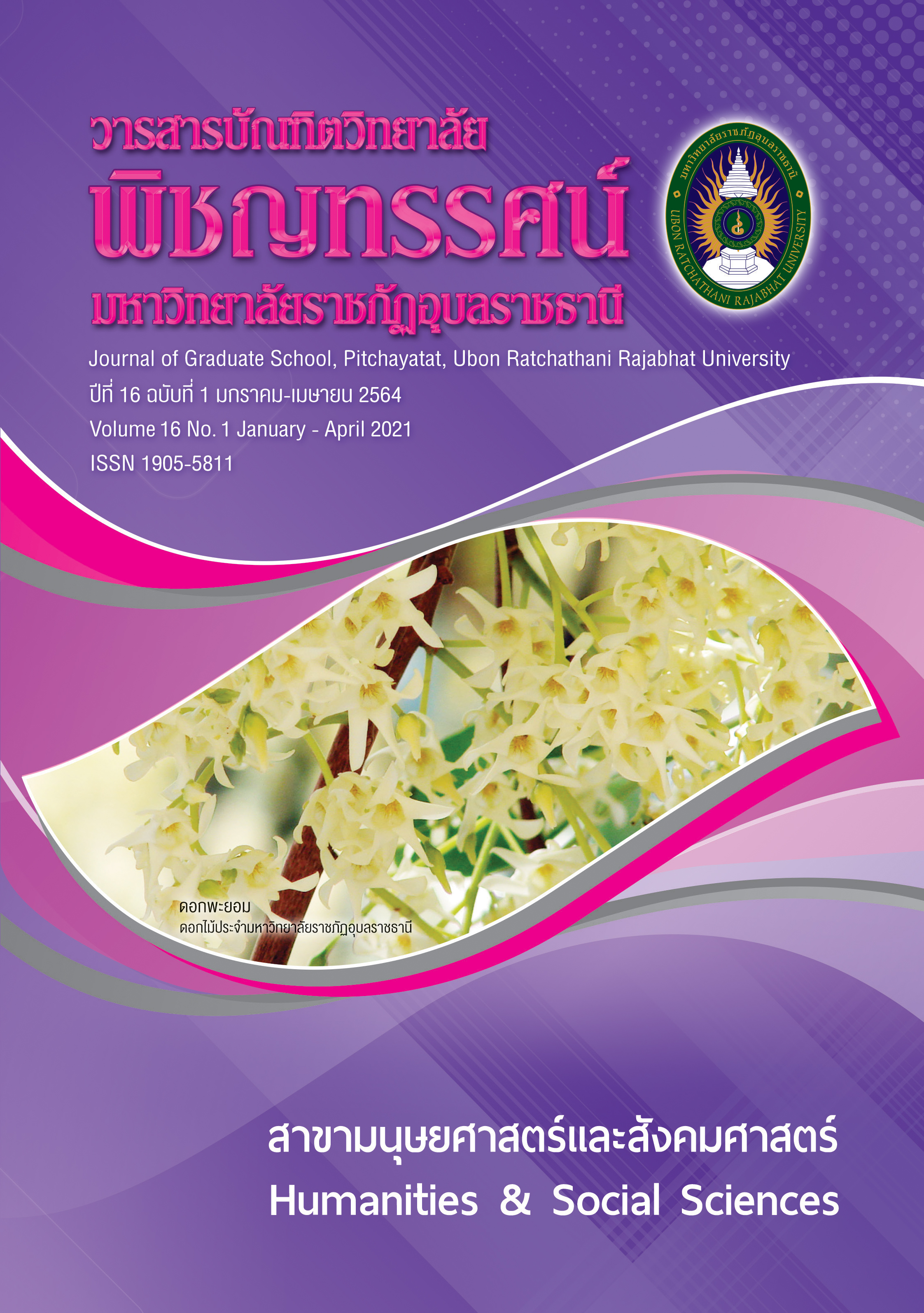การจัดการทรัพยากรวัฒนธรรมภายใต้แนวคิดการจัดการภาครัฐแนวใหม่
คำสำคัญ:
การจัดการ, ทรัพยากรวัฒนธรรม, จัดการภาครัฐแนวใหม่บทคัดย่อ
การจัดการภาครัฐแนวใหม่เพื่อต้องการลดบทบาทของภาครัฐในการจัดบริการสาธารณะ โดยอาศัย ทฤษฎีเศรษฐศาสตร์สถาบันใหม่ ทฤษฎีการจัดการนิยม และแนวคิดหลัก 4 กระแสที่ผสมผสานกันขึ้นเป็นแนวคิด การจัดการภาครัฐแนวใหม่ ประกอบด้วย แนวคิดเศรษฐศาสตร์นีโอคลาสสิก แนวคิดการจัดการนิยม แนวคิดประชารัฐ และแนวคิดทางกฎหมายปกครองและหลักนิติธรรม ก่อนการตัดสินใจดำเนินนโยบายสาธารณะหรือแนวทางปฏิบัติที่รัฐบาลหรือหน่วยงานได้กำหนดขึ้นเพื่อนำไปปฏิบัติ การจัดการภาครัฐแนวใหม่ เสนอให้มีการทบทวน การบริหารก่อนโดยสามารถดำเนินการได้ 2 แนวทาง คือ การวิจัยกระบวนการ การศึกษาข้อคิดเห็นและข้อโต้แย้งของนโยบาย การจัดการภาครัฐแนวใหม่ ตั้งอยู่บนสมมุติฐานของความเป็นสากลของทฤษฎีการบริหารและเทคนิควิธีการจัดการ สามารถนำไปประยุกต์ใช้ทั้งการบริหารภาครัฐและการบริหารธุรกิจ การบริหารงานภาครัฐด้านการจัดการทรัพยากรวัฒนธรรม ทรัพยากรวัฒนธรรม สร้างสรรค์ขึ้นมาบนพื้นฐานความเชื่อศรัทธาในศาสนาและวิถีของกลุ่มชาติพันธ์ ทรัพยากรวัฒนธรรมแบ่งออกเป็น 2 ประเภท คือ มรดกทางวัฒนธรรมที่จับต้องได้ และมรดกทางวัฒนธรรมที่จับต้องไม่ได้ ทรัพยากรวัฒนธรรมที่เป็นมรดกทางวัฒนธรรม มีวัตถุประสงค์ของการจัดการ คือ การอนุรักษ์และการคุ้มครอง ทรัพยากรวัฒนธรรมประเภทสิ่งที่สร้างขึ้นมาใหม่มีวัตถุประสงค์ของการจัดการ คือ การพัฒนา และการส่งเสริม แนวคิดการจัดการทรัพยากรวัฒนธรรมตามแนวทางการบริหารจัดการภาครัฐแนวใหม่ มีแนวทางการศึกษาที่เป็นหัวใจสำคัญและสอดคล้องกับการจัดทรัพยากรทางวัฒนธรรม คือ การศึกษาวิจัยหรือการสร้างความรู้ การสงวนและการอนุรักษ์ และการให้ความสำคัญกับหลักนิติธรรมหรือนิติรัฐ เพื่อประกอบการตัดสินใจการกำหนดนโยบาย โดยผ่านกระบวนการการมีส่วนร่วมของชุมชน
เอกสารอ้างอิง
ธนิก เลิศชาญฤทธ์. การจัดการทรัพยากรวัฒนธรรม. กรุงเทพฯ: คณะโบราณคดี มหาวิทยาลัยศิลปาก, 2551.
บรรจง อมรชีวิน. การจัดการมุ่งผลสัมฤทธิ์: Managing for Results – MFR. กรุงเทพฯ: ภาพพิมพ์, 2556.
ปรีดา พูนสิน. การมีส่วนร่วมของชุมชนในการจัดการความรู้ทางศิลปวัฒนธรรม : กรณีศึกษาชุมชนวัดโสมนัส. กรุงเทพฯ: กรมส่งเสริมวัฒนธรรม, 2555.
ราชบัณฑิตยสถาน. พจนานุกรม ฉบับราชบัณฑิตยสถาน พ.ศ. 2554. (2554). กรุงเทพฯ: ศิริวัฒนาอินเตอร์พริ้นท์, 2556.
สายันต์ ไพรชาญจิตร์. การจัดการโบราณสถาน โบราณวัตถุ ศิลปวัตถุ และพิพิธภัณฑ์โดย องค์กร ปกครองส่วนท้องถิ่น. กรุงเทพฯ: สถาบันพระปกเกล้า, 2548.
Barzelay, M. The new public management: Improving research and policy dialogue. California, CA: University of California Press, 2001.
Gruening, G. “Origin and theoretical basis of new public management in International,” Public Management Journal. 4, 1 (2001): 1- 25.
Hood, C. “A Public Management for all Seasons?,” Public Administration Review. 69 (Spring 1991): 3-19.
Hughes, Owen E. Public Management and Administration: An Introduction. New York: St Martin’ Press, 1994.
Kamensky, J.M. “Role of the Reinventing Government Movement in Federal Management Reform,” Public Administration Review. 56 (May/June 1996):
247-255.
King, Thomas. F. Doing Archaeology: A Cultural Resource Management Perspective. California: Left Coast Press, 2005.
Taylor, Frederick W. Scientific Management. New York: Harper and Brothers, 1991.
UNESCO. Operational Guidelines for the Implementation of the World Heritage Convention. Paris: UNESCO World Heritage Centre, 2008.
Weber, Max. The Theory of Social and Economic Organization. Oxford: Oxford University Press, 1974.
ดาวน์โหลด
เผยแพร่แล้ว
รูปแบบการอ้างอิง
ฉบับ
ประเภทบทความ
สัญญาอนุญาต
บทความทุกเรื่องได้รับการตรวจความถูกต้องทางวิชาการโดยผู้ทรงคุณวุฒิภายนอกอย่างน้อย 3 คน ความคิดเห็นในวารสารพิชญทรรศน์เป็นความคิดเห็นของผู้นิพนธ์มิใช่ความคิดเห็นของผู้จัดทำ จึงมิใช่ความรับผิดชอบของวารสารพิชญทรรศน์ และบทความในวารสารพิชญทรรศน์สงวนสิทธิ์ตามกฎหมายไทย การจะนำไปเผยแพร่ต้องได้รับอนุญาตเป็นลายลักษณ์อักษรจากกองบรรณาธิการ





